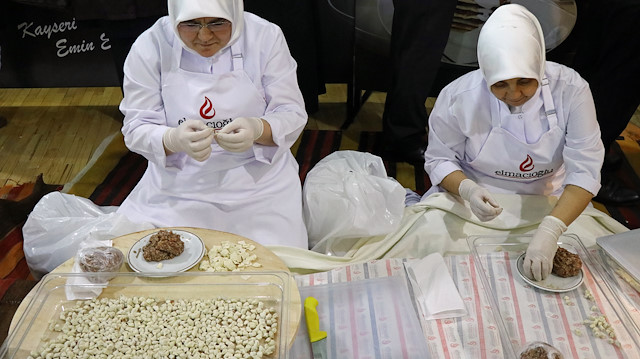
Famous with small dumplings, cured meat and traditional sausage, Kayseri cuisine has lots to offer
A central Anatolian province in Turkey seeks to be included in gastronomy cities with its local food culture, which includes well-known Turkish delicacies.
“One needs to taste Kayseri cuisine to know it. The cuisine of our city, which hosted many civilizations, are carrying traces of those civilizations,” Memduh Buyukkilic, metropolitan mayor of Kayseri province, told Anadolu Agency.
“In order to promote Kayseri cuisine and share our values, we will hold a Gastronomy Workshop on Nov. 16-17,” he said, adding that they planned to hold the workshop in winter while keeping in mind that people coming to the city to enjoy at Mt. Erciyes would find an opportunity to attend the event.
He said that manti -- small dumplings filled with minced meat and served with yoghurt and garlic sauce -- is the first dish that comes to mind from rich Kayseri cuisine. Kayseri dumplings are famous for its extremely small size and 40 of them can be fit in one spoon.
“Along with pastirma and sucuk, we have various desserts and local food,” Buyukkilic said.
Pastirma is a Turkish delicacy which is made of pressed beef after being cured in red pepper and garlic. Sucuk is a traditional sausage made with ground meat, usually beef or lamb, with a high fat content and added spices.
Giving details of the workshop, Buyukkilic said they are planning to turn the workshop into a congress in the future to gain fame for the cuisine worldwide.
“Tourists coming to Mt. Erciyes for ski tourism love the Kayseri cuisine. [Southeastern Turkish cities of] Gaziantep, Adana and Hatay cuisines are good, but Kayseri cuisine is very good,” he said.
Buyukkilic said they hope to transform the city into a gastronomy center.
- ‘Foreigners curious about food stories’
Nuri Corbacioglu, a tourism professional, said that people want to explore new tastes as well as new places.
“Gastronomy tourism is just starting to become popular in Turkey,” Corbacioglu said, adding the “delightful” tourism will become more enjoyable once the workshops are held.
“Foreign guests want to listen to the stories of foods and to see ways to prepare them,” he added.


